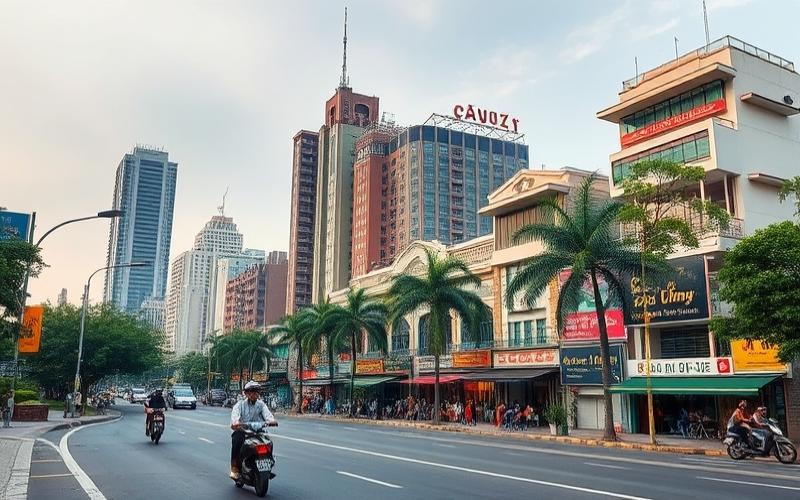
 Published on and written by Cyril Jarnias
Published on and written by Cyril Jarnias
Investing in Vietnam through a Real Estate Civil Company (SCI) has become an increasingly attractive option for investors looking to leverage a dynamic and rapidly growing real estate market. With a booming economy and a favorable legislative framework, Vietnam is attracting numerous players in the real estate sector.
However, although opportunities are plentiful, it is essential to navigate carefully, as there are potential pitfalls to avoid in order to maximize returns.
This article provides an in-depth exploration of the unique advantages of investing via an SCI in Vietnam while highlighting the necessary precautions to minimize the risks associated with this promising initiative.
Optimizing the Legal Structure for Investing in Vietnam
The main legal forms available to foreigners wishing to invest in Vietnam are:
- Limited Liability Company (LLC): the most common form for foreign investors, offering limited liability and relatively flexible capital requirements. It can be owned by one or more partners, individuals or legal entities.
- Joint Stock Company (JSC): suitable for large-scale projects, allows the issuance of shares and public fundraising.
- Joint Venture: a company formed with a Vietnamese partner, often necessary in restricted or regulated sectors.
- Branch: primarily for foreign companies already established that wish to operate directly without a separate local entity.
- Other specific forms such as the Business Cooperation Contract (BCC) or participation in Public-Private Partnerships (PPP).
| Legal Form | Foreign Access | Liability | Main Advantages | Main Disadvantages |
|---|---|---|---|---|
| LLC | Yes | Limited | Flexibility, full control | Sometimes conditional sectors |
| JSC | Yes | Limited | Easier fundraising | More complex governance |
| Joint-Venture | Yes | Limited | Easier access to certain markets | Risk of conflict between partners |
| Branch | Limited | Not separate | Direct operation | Significant sectoral restrictions |
| BCC / PPP | Conditional | According to agreement | Risk sharing | Contractual and regulatory complexity |
Impact on Investment via an SCI
The Real Estate Civil Company (SCI) is a very common structure in France for holding real estate assets but has no direct equivalent in Vietnamese law. In Vietnam, real estate ownership by foreigners is strictly regulated:
- Only certain locally recognized legal forms (mainly LLC/JSC) allow the acquisition of certain types of real estate assets under specific conditions.
- The French SCI does not benefit from local recognition in Vietnam; therefore, it is generally not possible to invest directly via a classic SCI.
Potential Advantages Linked to the Local Equivalent Structure
A typical corporate structure like an LLC/JSC still offers some advantages similar to those sought with an SCI:
- Separation of personal and professional assets
- Facilitated transfer via sale of company shares
- Possibility to optimize tax management according to applicable tax treaties
- Administrative flexibility regarding the management of the held asset
List of Possible Tax and Administrative Benefits
- Possibility to deduct certain expenses from generated income
- Facilitated progressive transfer (partial sale)
- Protection against personal asset risk
Potential Disadvantages
However, several major disadvantages must be noted:
- Legal restrictions on direct access to land ownership by foreigners persist – they can only purchase certain types of properties (residential housing under long-term lease) and only in certain authorized areas.
- The absence of formal recognition of the “SCI” vehicle requires either:
- To go through an ad-hoc Vietnamese company whose purpose must strictly comply with the local Civil Code,
- To possibly resort to indirect holding via a reliable local partner (increased risk)
- Strict reporting obligations apply both at creation and throughout the company’s life
- Local tax regimes differ significantly from the French regime applied to SCIs.
Synthetic List of Specific Constraints
- Mandatory obtaining of the investment registration certificate + business registration certificate before any operation
- Increased monitoring on fund origin/identity of the ultimate beneficial owner
- Submission to strengthened Vietnamese anti-money laundering controls
Practical Issues & Local Compliance
To optimize your strategy:
- Precisely verify if your project falls under sectors open or conditional to Foreign Direct Investment according to the Investment Law/Enterprise Law 2020;
- Systematically prepare a solid file respecting all local documentary requirements;
- Plan from the start a clear structure including partnership agreement/articles of association adapted to the Vietnamese context;
- Imperatively surround yourself with:
- A local specialized legal counsel,
- An accountant expert in both Franco-Vietnamese tax law and local banking practice;
- Anticipate all post-creation obligations: annual reporting/tax declarations/payments of local taxes.
Important:
Any attempt at “direct importation” of the French model (like that of the SCI) without adaptation strongly exposes to local legal risks and even contractual nullities.
In summary: always favor a locally recognized structure such as an LLC/JSC specifically adapted to the envisaged real estate project while ensuring beforehand full compliance with the Vietnamese regulatory framework to guarantee legal/tax security sustainably around your international real estate investment.
Good to Know:
To optimize the legal structure when investing in real estate in Vietnam via a Real Estate Civil Company (SCI), it is essential to understand the various options available to foreign investors, such as the wholly foreign-owned enterprise (WFOE) and the joint venture, each with its own tax and administrative implications. Using an SCI can offer significant tax advantages and administrative flexibility, although it is primarily suited for French resident managers. However, strict regulations in Vietnam, such as limitations on foreign land ownership, as well as the need to comply with local requirements, like registration and adherence to Vietnamese tax laws, sometimes complicate its creation. A practical tip would be to consult local legal experts to navigate these restrictions and optimize your investment strategy.
The Advantages of Investing via an SCI
Flexibility in Real Estate Asset Management
The SCI allows for simplified and personalized management of real estate investments. Each partner holds shares proportional to their contribution, which facilitates collective decision-making and the adaptation of management rules according to the group’s needs. Property management is no longer tied to a classic co-ownership, often a source of deadlock, but to a statutory operation adapted to the partners’ objectives.
- Possibility to appoint a manager to represent the SCI and make routine decisions.
- Customizable articles of association precisely defining management methods and profit distribution.
- Easy adaptation to changes in partner composition (entry or exit).
Ease of Asset Transfer
The SCI simplifies the transfer of real estate assets, as it involves transferring company shares and not physical properties, thus avoiding succession co-ownership and its constraints.
- Progressive transfer possible through donation of shares, limiting transfer duties at each stage.
- Facilitated valuation: company shares can include a discount for co-ownership or lack of control, reducing the taxable base.
- Centralized asset management, even with multiple heirs.
| Transfer Method | Direct Holding | Via SCI |
| Transfer by inheritance | Indivisible properties | Company shares |
| Potential blockage | Yes | No |
| Division of ownership rights | Complex | Simplified |
Tax Advantages
Real estate taxation in Vietnam presents certain advantages for holders via an SCI, although it must be adapted to local legislation.
- Possibility to choose between income tax or corporate tax based on optimization strategy.
- Accounting depreciation of real estate assets, allowing reduction of the taxable base on rental income.
- Transfer via company shares can benefit from advantageous tax regimes, particularly regarding inheritance taxes.
- Possibility to repay current account contributions without immediate taxation, as it is a debt of the company to the partner.
Resource Pooling
The SCI is an ideal tool for bringing together several investors and acquiring assets of a larger scale than an individual investor could target.
- Pooling of funds from several partners.
- Easier access to bank credit thanks to better overall borrowing capacity.
- Diversification of the real estate portfolio.
| Advantage | Individual Investor | SCI (Multiple Partners) |
| Investment Amount | Limited | Higher |
| Diversification | Low | High |
| Access to Credit | Difficult | Easier |
Protection of Personal Assets
The SCI allows for the separation of personal assets from those held through the company. In case of debts or disputes related to the real estate investment, only the assets held by the SCI are engaged (except in cases of management fault or personal guarantees given).
- Liability limited to the proportion of shares held.
- Personal assets of partners protected against creditors of the SCI, except for personal guarantees.
Legal Specificities in Vietnam
The Vietnamese legal framework presents certain particularities for foreign investors and the use of corporate structures.
- Foreigners cannot directly own land, but can acquire long-term lease rights (up to 50 years, renewable).
- SCI-type structures allow for collective management and facilitate compliance with local rules regarding acquisition and holding.
- The SCI can serve as a vehicle to centralize the management of real estate rights, especially when multiple foreign investors are involved.
Key takeaway: The SCI, even adapted to the Vietnamese context, requires precise statutory drafting and legal monitoring to guarantee its compliance with local requirements and maximize its advantages.
Good to Know:
Opting for an SCI in Vietnam offers flexible real estate management, allowing investors to easily structure and personalize the management of their assets. In terms of succession, the SCI simplifies asset transfer by converting real estate assets into company shares, thus avoiding the complexities of direct property transfer. Tax-wise, the SCI benefits from specific advantages such as reduced tax rates on property income and relief during transfer. Resource pooling through an SCI enables the mobilization of multiple investors, opening the possibility of acquiring larger-scale properties. Furthermore, an SCI protects personal assets from investment-related debts, thus limiting risks. Finally, the Vietnamese legal framework presents particular characteristics that favor the use of an SCI for investing effectively and securely in local real estate.
Pitfalls to Avoid When Buying Real Estate in Vietnam
Pitfalls to Avoid When Buying Real Estate in Vietnam:
- Purchasing a property without verifying the legality of the ownership titles (e.g., absence of the “pink book”).
- Relying on unrecognized developers or offers that are too attractive.
- Neglecting the translation and understanding of contracts, often drafted only in Vietnamese.
- Ignoring additional fees (taxes, commissions, renewal of usage rights).
- Underestimating cultural differences in negotiations and contract signing.
Legal and Administrative Complexities for Foreign Investors:
| Aspect | Detail |
|---|---|
| Land Ownership | Foreigners cannot own the land, only the buildings. The land is leased from the state for a limited period (often 50 years). |
| Holding Period | Usage right renewable after 50 years. Renewal is not automatic; it depends on state policy. |
| Quantitative Restrictions | Foreigners cannot own more than 30% of the units in a building. |
| Property Location | Certain strategic sectors or areas near borders are prohibited for purchase by foreigners. |
| Financing | Vietnamese banks generally do not grant real estate loans to foreigners without a long-term visa or residence. |
| Documentation | Obligation to verify the seller’s possession of the “pink book” (official ownership title). |
| Taxation | VAT (5 to 10%), registration tax (0.5%), income tax on resale (2% of sale price), annual land tax. |
Risks Related to Construction Quality and Developer Choice:
- Some developers do not comply with local construction standards.
- Risk of project delays or abandonment.
- Absence of ten-year guarantees or reliable after-sales service.
- Imperative verification of the developer’s reputation, track record, and financial solidity.
Importance of Surrounding Yourself with Reliable Local Advisors:
- Engage a lawyer or notary specialized in real estate and familiar with the specifics of purchases by foreigners.
- Rely on recognized and transparent real estate agencies.
- Use professional translators for all contractual documents.
- Seek the support of a local tax expert to anticipate tax obligations and avoid surprises.
Cultural Differences and Local Business Practices to Know:
- Negotiations are often lengthy and may include implicit expectations of gifts or tips.
- Administrative delays can be longer than expected.
- Business practices may differ: importance of network, use of local intermediaries, preference for verbal agreements.
- Transparency on fees and commissions is not systematic, hence the importance of putting everything in writing.
Key Takeaway:
Ensuring the legality of the transaction, carefully choosing local partners, understanding legal and administrative limitations, and respecting cultural practices are essential to securing a real estate purchase in Vietnam.
Good to Know:
When buying real estate in Vietnam, it is crucial to avoid several common pitfalls, particularly those related to the legal and administrative complexities faced by foreign investors. Vietnamese legislation imposes strict restrictions on land ownership, limiting possession to a 50-year lease for non-nationals with a possible extension. Ensure you choose properties located in areas authorized for foreigners to reduce complications. Construction quality can vary significantly, so it is essential to carefully select reputable real estate developers to minimize the risks of defects. Navigating these complexities absolutely requires the use of experienced Vietnamese legal and financial advisors to avoid costly mistakes. Furthermore, adapt to cultural differences and local business practices that could influence negotiations and transaction conclusions, taking into account, for example, different expectations regarding negotiation and partnership.
Understanding Corporate Law for an SCI in Vietnam
Legal Framework Governing the SCI in Vietnam
In Vietnam, the concept of a “real estate civil company” (SCI), as known in French law, does not strictly exist. The equivalent legal structures for real estate investment are generally limited liability companies (LLCs), joint stock companies, or joint ventures. The sector is primarily regulated by three major laws:
- Land Law (amended 2024, effective January 1, 2025)
- Law on Real Estate Business
- Housing Law
These texts aim to strengthen market transparency, streamline investments, and ensure rigorous management of real estate projects.
Tax Obligations
The main tax obligations for an entity investing in real estate include:
- Payment of corporate income tax
- VAT on real estate transactions
- Specific land taxes based on the nature of the property and intended use
It is essential to comply with the periodic declarations required by the Vietnamese tax administration to avoid any disputes or penalties.
Specific Regulations for Foreign Investments
For foreign investors:
- It is not possible to directly acquire land in Vietnam, as all land belongs to the state.
- Foreigners can obtain a land use right via leasehold agreements that can go up to 50 years renewable.
- The law now provides for better openness for certain profiles like the Vietnamese diaspora.
Comparative Table: Land Law – Foreigners vs Nationals
| Criterion | Nationals | Foreigners |
| Direct Ownership | Yes | No |
| Usage Right (“LUR”) | Yes | Yes (under conditions) |
| Maximum Duration | Unlimited/Long term | Up to 50 years (+renew.) |
Note: Since January 2025, some procedures have been relaxed to attract more foreign capital.
Necessary Registration Process
General steps to create a structure dedicated to a real estate project:
- Choice of the appropriate corporate form (generally LLC or joint venture).
- Registration with the local Department of Planning and Investment.
- Obtaining the business registration certificate.
- Possible application for a specific certificate authorizing the real estate project.
- Compliance with increased documentary requirements since August 2024 concerning financial transparency and technical documentation.
List of key required documents:
- Officially translated articles of association
- Financial proof demonstrating the required minimum capital
- Preliminary contracts or commitments with potential local partners
- Environmental permits depending on the size/project
Major Differences with Incorporation Elsewhere
Compared to France where an SCI can be simply formed between individuals without minimum capital or prior approval, in Vietnam:
- Any acquisition must go through a legally recognized commercial structure;
- The minimum charter capital is strictly controlled;
- The business purpose must precisely match the type of envisaged real estate operations;
- Administrative procedures are longer and often require a local partner to secure certain rights.
Synthetic Table: SCI France vs Equivalent Structure Vietnam
| Aspect | SCI France | VN Structure |
| Minimum Capital | None | Mandatory |
| Direct Land Access | Yes | No |
| Creation Procedure | Simple | Complex |
| Foreign Partnership | Free | Restricted/Regulated |
Legal Compliance Tips / Common Pitfalls
- Meticulously verify all authorizations before final signature
- Ensure all contracts are validated in the local language AND translated
- Scrupulously respect all tax obligations from incorporation
- Anticipate any recent regulatory changes (especially post August 2024/January 2025)
Special Attention: The total absence of direct foreign private ownership exposes to risks if the legal structure is inadequate; it is imperative to rely on specialized local advice.
Land Ownership Implications & Foreign Restrictions
Since January 2025, the rules concerning foreign access to real property rights have been clarified, but remain restrictive: formal impossibility to acquire the land itself; mandatory recourse to leasehold; frequent necessity of partnerships with approved Vietnamese actors, especially in certain sensitive or strategic areas.
Frequent pitfalls:
- Misinterpretation of lease duration/attached rights
- Absence of clear clause in case of resale/transfer of company shares
Recourse in Case of Commercial Disputes
In case of conflict related to a real estate investment:
- Favor as much as possible alternative methods such as mediation/international commercial arbitration recognized locally
- Possible referral to specialized Vietnamese economic courts
- Possibility to limit risks via arbitration clauses inserted from the initial drafting of articles/contracts
Key takeaway: Any operation requires rigorous anticipation both legally and operationally given persistent local particularities despite recent reforms favorable to structured investors.
Important text: In Vietnam, there is formally no “SCI” as in France. Any real estate investment must obligatorily transit through a duly registered commercial entity under strict state control – even when it is only about “associating several individuals around a property”.
Good to Know:
In Vietnam, the formation of an SCI is subject to a rigorous legal framework, notably by the Enterprise Law, which requires foreign investors to often partner with local partners to meet capital and ownership obligations. Unlike other countries, Vietnamese SCIs must undergo specific registration procedures with the Department of Planning and Investment, while respecting regulations on taxation and annual financial reporting. Restrictions on land ownership for foreigners require that investors can only hold long-term leases rather than full properties, thus complicating the usual SCI structure. To avoid common pitfalls, investors must ensure due diligence and resort to local legal counsel to guarantee compliance and anticipate potential commercial disputes.
Disclaimer: The information provided on this website is for informational purposes only and does not constitute financial, legal, or professional advice. We encourage you to consult qualified experts before making any investment, real estate, or expatriation decisions. Although we strive to maintain up-to-date and accurate information, we do not guarantee the completeness, accuracy, or timeliness of the proposed content. As investment and expatriation involve risks, we disclaim any liability for potential losses or damages arising from the use of this site. Your use of this site confirms your acceptance of these terms and your understanding of the associated risks.











































